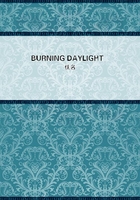
第42章
The plan was his own, but he sent down to the States for competent engineers to carry it out. In the Rinkabilly watershed, eighty miles away, he built his reservoir, and for eighty miles the huge wooden conduit carried the water across country to Ophir. Estimated at three millions, the reservoir and conduit cost nearer four. Nor did he stop with this. Electric power plants were installed, and his workings were lighted as well as run by electricity. Other sourdoughs, who had struck it rich in excess of all their dreams, shook their heads gloomily, warned him that he would go broke, and declined to invest in so extravagant a venture.
But Daylight smiled, and sold out the remainder of his town-site holdings.
He sold at the right time, at the height of the placer boom. When he prophesied to his old cronies, in the Moosehorn Saloon, that within five years town lots in Dawson could not be given away, while the cabins would be chopped up for firewood, he was laughed at roundly, and assured that the mother-lode would be found ere that time. But he went ahead, when his need for lumber was finished, selling out his sawmills as well. Likewise, he began to get rid of his scattered holdings on the various creeks, and without thanks to any one he finished his conduit, built his dredges, imported his machinery, and made the gold of Ophir immediately accessible. And he, who five years before had crossed over the divide from Indian River and threaded the silent wilderness, his dogs packing Indian fashion, himself living Indian fashion on straight moose meat, now heard the hoarse whistles calling his hundreds of laborers to work, and watched them toil under the white glare of the arc-lamps.
But having done the thing, he was ready to depart. And when he let the word go out, the Guggenhammers vied with the English concerns and with a new French company in bidding for Ophir and all its plant. The Guggenhammers bid highest, and the price they paid netted Daylight a clean million. It was current rumor that he was worth anywhere from twenty to thirty millions.
But he alone knew just how he stood, and that, with his last claim sold and the table swept clean of his winnings, he had ridden his hunch to the tune of just a trifle over eleven millions.
His departure was a thing that passed into the history of the Yukon along with his other deeds. All the Yukon was his guest, Dawson the seat of the festivity. On that one last night no man's dust save his own was good. Drinks were not to be purchased. Every saloon ran open, with extra relays of exhausted bartenders, and the drinks were given away. A man who refused this hospitality, and persisted in paying, found a dozen fights on his hands. The veriest chechaquos rose up to defend the name of Daylight from such insult. And through it all, on moccasined feet, moved Daylight, hell-roaring Burning Daylight, over-spilling with good nature and camaraderie, howling his he-wolf howl and claiming the night as his, bending men's arms down on the bars, performing feats of strength, his bronzed face flushed with drink, his black eyes flashing, clad in overalls and blanket coat, his ear-flaps dangling and his gauntleted mittens swinging from the cord across the shoulders. But this time it was neither an ante nor a stake that he threw away, but a mere marker in the game that he who held so many markers would not miss.
As a night, it eclipsed anything that Dawson had ever seen. It was Daylight's desire to make it memorable, and his attempt was a success. A goodly portion of Dawson got drunk that night. The fall weather was on, and, though the freeze-up of the Yukon still delayed, the thermometer was down to twenty-five below zero and falling. Wherefore, it was necessary to organize gangs of life-savers, who patrolled the streets to pick up drunken men from where they fell in the snow and where an hour's sleep would be fatal. Daylight, whose whim it was to make them drunk by hundreds and by thousands, was the one who initiated this life saving. He wanted Dawson to have its night, but, in his deeper processes never careless nor wanton, he saw to it that it was a night without accident. And, like his olden nights, his ukase went forth that there should be no quarrelling nor fighting, offenders to be dealt with by him personally. Nor did he have to deal with any. Hundreds of devoted followers saw to it that the evilly disposed were rolled in the snow and hustled off to bed. In the great world, where great captains of industry die, all wheels under their erstwhile management are stopped for a minute.
But in the Klondike, such was its hilarious sorrow at the departure of its captain, that for twenty-four hours no wheels revolved. Even great Ophir, with its thousand men on the pay-roll, closed down. On the day after the night there were no men present or fit to go to work.
Next morning, at break of day, Dawson said good-by. The thousands that lined the bank wore mittens and their ear-flaps pulled down and tied. It was thirty below zero, the rim-ice was thickening, and the Yukon carried a run of mush-ice. From the deck of the Seattle, Daylight waved and called his farewells. As the lines were cast off and the steamer swung out into the current, those near him saw the moisture well up in Daylight's eyes.
In a way, it was to him departure from his native land, this grim Arctic region which was practically the only land he had known. He tore off his cap and waved it.
"Good-by, you-all!" he called. "Good-by, you-all!"